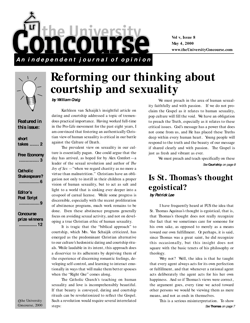What the education debate is and isn’t about
by Kathleen van Schaijik
To clear up some apparent confusion: Here is what proponents of a stronger core curriculum are not saying about FUS’ education.
They are not saying that we should do away with professional programs and offer nothing but humanities courses. They are not saying that professional training is useless. They are not saying such training is unimportant, and that every student should choose his major as if he expected to enjoy a lifetime of leisure. What they are saying is that training for a career is not the essence of higher education; its essence is the strengthening, expanding, deepening and perfecting of the mind. (They add, by the way, that perfecting the mind is excellent preparation for any graduate program or career, as well as for evangelization.) They say further that to achieve the proper end of education, a strong foundation in liberal arts is the time-tested, tradition-hallowed, insubstitutable means. Next, they point to the fact that despite some truly wonderful course offerings, the FUS core is comparatively weak and in need of fundamental reform so that it includes more liberal arts more thoughtfully arranged.
And for this they get labeled extremists, elitists and medievalists, who are trying to remake FUS after the image of Thomas Aquinas College. How does this happen? Where does it come from?
The Core Curriculum Task Force has just unveiled its proposal for a new core, which apparently represents only a minor improvement over our current core. For instance, it still includes only one philosophy course. Professor Lee, who is on the Task Force, told me that he hasn’t been able to find a single other Catholic university that requires so little philosophy, nor one that dedicates as few total credit hours to the core. Shouldn’t that tell us something? He used the analogy of a father who asks himself whether he is spending too much time away from home. One way—not the only way, but a helpful way—of finding out would be for him take note of what other Catholic fathers do. If he discovers that every other Catholic father he knows is spending significantly more time with his family, he would have a pretty good indication—not a proof, but an indication—that some lifestyle adjustment on his part was in order.
If we continue this debate next year—and I hope we will, since we have a long way to go before we reach something like consensus—let’s make sure we dispute with one another’s real views and concrete proposals, and not with caricatures and straw men.


